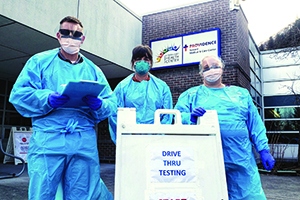By LISA EISENHAUER and JULIE MINDA
While some organizations are warning that the COVID-19 pandemic could spell doom for many rural hospitals that were already on shaky financial ground before the crisis, several executives with rural Catholic hospitals say they expect their organizations to withstand the health emergency with government help.
In April, the National Rural Health Association warned of more trouble ahead. The organization said nearly half of rural hospitals were losing money before they added to their financial precariousness by canceling nonemergency services because of the pandemic. "The rate of rural hospital closures, already at crisis levels preCOVID-19, will soon escalate to cataclysmic rates," the association said.

Staff members work at an outdoor COVID-19 screening and testing site on the campus of Providence Seward Medical Center in Alaska.
Twelve rural hospitals closed in the first five months of the year, eight of them in March and April, and 18 closed last year, according to the North Carolina Rural Health Research Program at the University of North Carolina at Chapel Hill.
Many hospitals and health systems have gone public about their financial woes related to the national emergency. Franciscan Missionaries of Our Lady Health System based in Baton Rouge, Louisiana, said in a press release in mid-April that it expected its net revenue losses for April and May to be about $120 million.
Rene Ragas, president of FMOL's Our Lady of the Angels Hospital in Bogalusa, Louisiana, said that while his rural hospital fell behind budget in March, it wasn't operating in the red. April proved harsher. For the first half of the month, the hospital had billed $2.5 million less compared to the year before.
Despite the challenges, Ragas said the hospital, one of the largest employers in a parish of about 46,000, will weather the crisis. He credited money from the Coronavirus Aid, Relief, and Economic Security — or CARES Act — and the hospital's affiliation with FMOL.
"I don't think we're in a position where we have any fear of closing," Ragas said.
Many other executives with rural Catholic hospitals said they are worried about the financial repercussions of the drastic changes they have had to make to their operating models because of the pandemic. Those changes included temporarily suspending elective procedures and outpatient care.
While many hospitals have restarted some or most of the suspended services, some executives said their balance sheets will need shoring up because of the months of lost revenue.
Help falls short
On its website, the American Hospital Association called the CARES Act that President Donald Trump signed on March 27 an important first step forward to aid rural hospitals in dire financial need due to the pandemic. According to the National Law Review, of the $175 billion allocated for the Provider Relief Fund through the CARES Act and the subsequent Paycheck Protection Program, $10 billion was earmarked for rural hospitals and clinics.
On June 9, the Department of Health and Human Services announced additional distributions of about $15 billion to eligible providers that participate in Medicaid and the Children's Health Insurance Program. Each provider will get at least 2% of reported gross revenue from patient care, the agency said. HHS said $10 billion more would go to "hospitals that serve a disproportionate number of Medicaid patients or provide large amounts of uncompensated care."
It is not known how many rural hospitals will qualify. The agency set up a portal for hospitals to report their patient revenue, which will be used to determine their share of the aid.
More will need to be done for rural providers to deal with the unprecedented challenge of this virus, the AHA stressed.
Kathy Curran is CHA senior director of public policy. She said CHA is working to ensure that hospitals get additional federal financial assistance for personal protective equipment, for testing and for COVID-19 treatment. "We want to make sure rural and safety net hospitals are treated equitably when Washington, D.C., is allocating funding," she said.
Curran said the Centers for Medicare & Medicaid Services was quick to give providers flexibility to offer telehealth and virtual care in order to restore access to some nonessential care that had been discontinued during the pandemic to safeguard patients. But many rural communities do not have access to high-speed internet to support such services. "We need to address the problem of rural broadband access," she noted.
Lifeblood
Executives with Catholic systems who spoke with Catholic Health World said that prior to the pandemic, their rural hospitals were in fairly good financial shape, as compared with many other rural hospitals.

Smith
Angie Smith is vice president of nursing for St. Bernards Medical Center in Jonesboro, Arkansas. The hospital's parent system, St. Bernards Healthcare, includes rural facilities. She said that because of good financial stewardship her system was well prepared for emergencies like natural disasters. However, the pandemic's scope and duration have taken a deep bite. To stem financial losses, St. Bernards has implemented furloughs and asked other staff members to voluntarily reduce their hours.
St. Bernards' chief executive had recommended across-the-board salary reductions to offset the system's COVID-related losses and to reduce the necessity for more widespread furloughs. Smith was among vice presidents who agreed to take salary reductions.

Thurman
DeAnn Thurmer, president of SSM Health's Waupun Memorial Hospital and Ripon Medical Center, both in Wisconsin, said that the temporary suspension of elective surgical services and outpatient procedures to reduce contagion risk dealt a hard financial blow. (Those services have been resumed.)
Additionally, Thurmer said, the two hospitals incurred costs to retrain clinicians to care for patients with COVID-19. For example, because critical care nurses are in short supply in rural hospitals, floor nurses and respiratory department clinicians were trained in assisting with caring for COVID-19 patients in the emergency department and intensive care unit. Thurmer said that CARES Act funding, while welcome, won't make up for the anticipated financial shortfall.
In an April 13 email to four Wisconsin legislators, Thurmer wrote: "The federal government's relief is not going to be enough. Hospitals in Wisconsin are already being forced to furlough staff, reduce payroll and conserve precious personal protective equipment because of massive reductions in revenue and the availability of supplies. We are asking for the state legislature to prioritize hospitals and ensure adequate funding for hospitals and health care works."
Relying on efficiencies
Richard Morin, interim president for the CHRISTUS Spohn Alice and Kleberg hospitals in south Texas, said both hospitals were financially healthy through February. "March was a difficult month, same thing will be for April," Morin said in mid-April.
Nevertheless, Morin isn't predicting doom, in part because of steps the hospital is taking on its own to address expenses, such as partnering with local sources to keep costs down, and in part because his hospitals have the backing of the CHRISTUS system. "Every month we are working to make sure we're as efficient as possible, that we're being good stewards of our resources," he said of his hospitals.
Double advantage
Providence Seward Medical Center has only six inpatient and two emergency room beds for the community of about 3,000 it serves on the southern coast of Alaska.
The little hospital has a seemingly safe financial niche even amid the extra challenges created by the coronavirus crisis, thanks to being publicly owned and tax-supported by the town and its affiliation with Providence Alaska, which the community contracts with for management.
"There's kind of a double advantage," Administrator Robert Rang said. "We do have the resources of Providence to get us through the pain point, but the city has also recognized that this could affect our revenue for a while and understands that they may need to help us out."